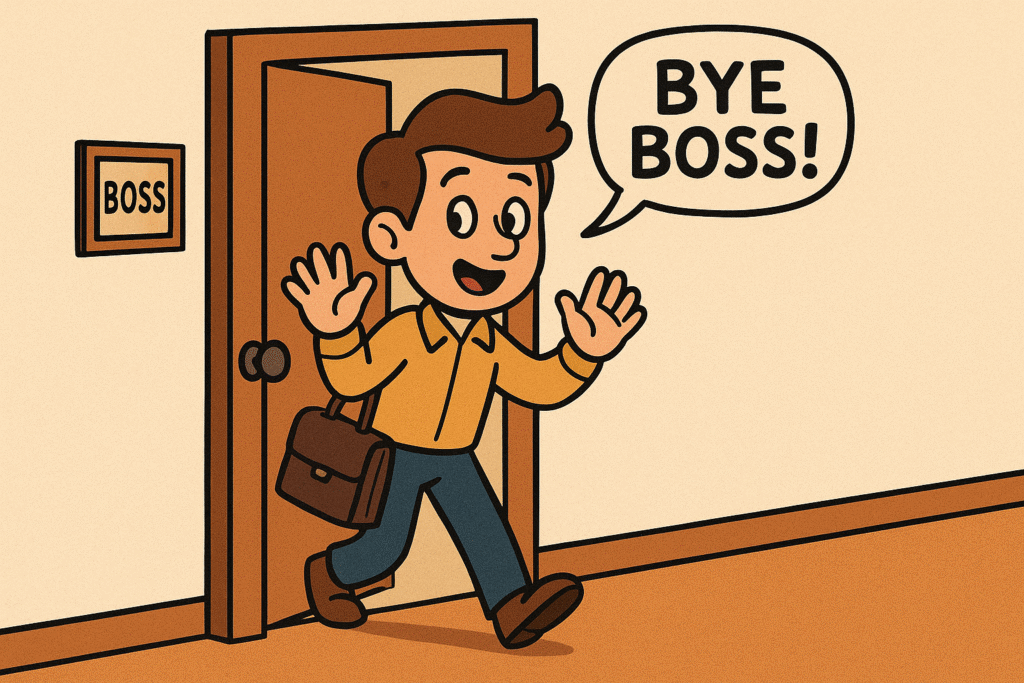
When you don’t get paid for overtime, but companies are still insistent that you spend time in the office when you have nothing to do, how is this fair? First, it is clear that most work is based on business needs, which ebb and flow as the year progresses. The lack of forecastability means that there is difficulty for employers to hire the labor when they need it. People may be afraid to leave early because it might signal that they have too little work. This goes hand in hand with the fact that work is no longer piecemeal, and the contribution of a single employee is almost impossible to measure. At the same time, if there is a lull period, the same fears keep people from working on their own thing or even relaxing by surfing Reddit. As such, they end up trying to be busy, or just doing pointless work.
Navigating Office Culture and Perception
In many workplaces, there’s an unspoken rule: don’t leave before the boss. The anxiety surrounding this rule is rooted in office culture. Employees often worry that leaving early could be perceived as a lack of dedication or an indication that they’re not pulling their weight. This perception can have real consequences, including missed promotions, negative evaluations, or even job loss. The traditional mindset that equates long hours with productivity still persists in many organizations. Despite advancements in understanding that productivity is not solely tied to hours worked, the cultural inertia remains. Employees feel compelled to be physically present in the office, even if their tasks are complete, to demonstrate their commitment.
The Busy Work Conundrum
During periods of low activity, the fear of being perceived as unproductive often leads employees to engage in “busy work.” This involves tasks that may appear productive on the surface but have little to no actual value. Examples include excessive email checking, rearranging files, or attending unnecessary meetings. Busy work serves to fill time rather than achieve meaningful outcomes. In some cases, employees may avoid working on personal projects or relaxing, such as surfing Reddit, during these lulls. The fear of being caught doing non-work-related activities can deter them from making the most of their downtime. Instead, they strive to appear busy, which can lead to burnout and reduced job satisfaction over time.
Reassessing Productivity and Output
As an employee, it’s important to reassess how you measure your own productivity and output. Rather than focusing solely on hours spent in the office, shift your emphasis to the quality and effectiveness of the work you produce. Advocate for yourself by communicating your achievements and contributions to your manager, highlighting the impact of your work rather than the time spent on it.
Consider proposing flexible work arrangements, such as remote work or flexible hours, if they align with your role. Managing your own time allows you to work when you are most productive and take breaks when needed. This approach can lead to higher job satisfaction, better work-life balance, and ultimately, improved performance.
Encouraging Open Communication
To feel comfortable about leaving the office early, it’s crucial to foster open communication with your superiors. Regularly discuss your workload and any concerns you might have about time management. By being transparent about your productivity and achievements, you can help dispel fears and misconceptions about leaving early.
Engage in regular check-ins with your manager to set clear expectations and ensure your performance is evaluated based on results rather than hours spent in the office. This transparency can alleviate anxiety and make it easier for you to adjust your work hours according to the demands of your tasks, ensuring that you are judged on the quality of your work and not just your physical presence in the office.
A Balanced Approach
Ultimately, you want to be in a place that promotes a culture of efficiency and effectiveness, where the focus is on achieving meaningful outcomes rather than simply clocking hours. If this is available, don’t be afraid to take time for yourself to compensate for when work gets crazy. If not, consider asking for a raise or looking for a new job – you don’t want to be somewhere that does not value your time or treat you as an equal contributor to the business.